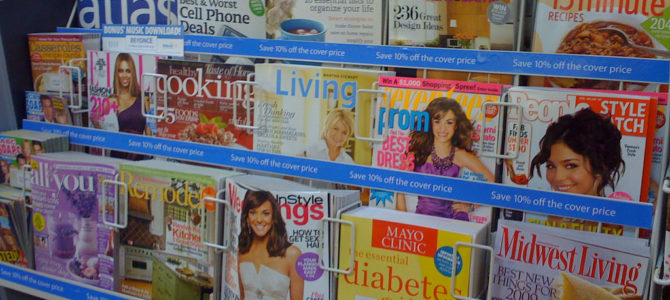
Today if a woman wants to read a magazine that celebrates femininity, her best bet is Maxim. There she can find praise for mothers who prioritize wellness, female entrepreneurship, and ladies in the arts.
Granted, this praise usually includes a fleshy photo-op, but it still beats Cosmopolitan’s lecture about gendered baby showers. And Marie Claire’s disdain for men who serve in the military. And Elle’s diagnosis that independent-thinking women are a problem.
Although once an effective tool to foster sorority, women’s magazines are slowly dismantling womanhood, one feminist idea at a time. These publications have yanked distinct femininity from women’s loving arms, creating a painful loneliness in American female culture.
The Struggle Is Real, But No Help for You
To start with, women’s magazines have a lot of demands about motherhood. Cosmo made a list of “10 Things You Should Never Say to New Moms.” This piece so generously insists that visitors should never burden mothers with more than one hour of company. New mothers should also expect any visitor to “bring some baked goods and make it snappy.”
In addition, any friend who utters the word “part-time” to a pregnant woman is not a friend at all. To imply that new-mom responsibilities might be more easily balanced with fewer work hours is gross. These tips are, of course, only for fellow women.
An expecting mother should require anyone with XY chromosomes to abstain from all joking commentary on her changing physicality, even if he means to comfort or celebrate her. As one Cosmo writer says of her own husband, “He can’t and will never understand what it feels like to have someone pass judgment, with good humor or not, on his body. It’s not something that happens to men.”
This Cosmo-girl persona doesn’t value fellowship, advice, or her husband’s opinion. She is not a true feminist. She’s an isolationist in matters of the heart.
Motherhood is a noble task and a great sacrifice, one not made easier by interpersonal red lines. Cosmo routinely reduces motherhood to a series of struggles, then discourages readers from embracing familial wisdom and spousal support. Of course, in order to encourage partnership women’s magazines would have to first concede that romance is a source of strength. By current standards, love just gets in the way and should be traded for sexual aggression.
Be Rootless. It Will Be Awesome
Take the article in which Marie Claire celebrated “The Death of the Cheesy Rom-Com,” instead favoring films in which “romances often lack labels, because they don’t know how they feel, or because they’re not so into monogamy.” But is that how real women feel?
Actually, female happiness has declined since the sexual revolution. Ross Douthat wrote in The New York Times that “a young woman’s likelihood of depression rose steadily as her number of partners climbed and the present stability of her sex life diminished,” based on studies from scholars Mark Regnerus and Jeremy Uecker.
Women largely want to direct their emotional energy toward one reciprocal target, but feminist magazine culture does not allow it. Instead, it demands that women masculinize their approach to relationships. While writing this article, the first five headlines under Marie Claire’s online subsection “Love” were:
- How to Pull off Tantric Sex
- The Hottest Porn for Women on The Internet
- 8 Must Try Sex Positions from Real Women
- The Best Kissing Tips and Tricks
- 10 Tips for a Better Orgasm
Magazines continue to belittle the psychological and biological miracle of romantic commitment instead uplifting brash, boundless promiscuity. Their aversion to maternity and traditional romance does little to empower women. It has made women insecure. It has convinced women that a modest life spent caring for the vulnerable is not ambitious enough, that the desire for romantic exclusivity is not liberated enough.
If women temper their own priorities to bolster another’s, magazines say no. If a woman longs for a male counterpart who will make her in some way more complete, magazines again say no.
This denial resounds especially with women, the quintessential creatures of connection. Women crowdsource experiences, victories, and difficulties. Pew Research found that women use personal social media like Pinterest and Instagram significantly more than men do. Cultural ideas reverberate between and fester among women because they constantly seek to link.
How to Live the Life of Your Dreams
So how can women have a sense of belonging without resorting to rags that undermine distinct femininity? It’s simple.
Make friends. Go to church. Join clubs. Invest in family. Show up for other women in the local community. It is a wonderful thing to exchange ideas far and wide, but the art of locality can protect women against bad ideas about womanhood that are from demagogues, by demagogues, and for demagogues.
Women’s magazines increasingly seek to elevate women above and away from their peers into some abstract and androgynous idea of feminism. Women should reject this and begin relying on and building their female communities at the smallest units.
They should commune with one another about how to live their best and most fulfilling life, how to cope with hard times, and even how to make lasagna and remove laundry stains. The fairer sex often possesses the gift of gab. To neglect it would be a shame.
Everyday experiences with and the appreciation for traditional femininity are nothing to be ashamed of. Women do not deserve to be bullied and intimidated by an industry that seeks to shroud all that differentiates women from men. Magazines have become the skewed voice of feminism. It’s time for women to courageously engage with each other and speak for themselves.









